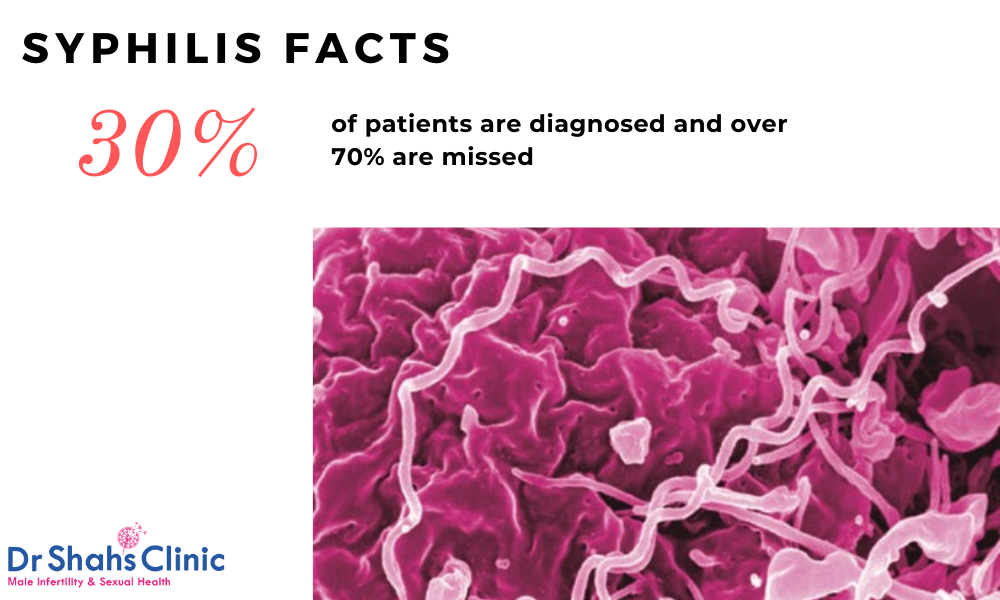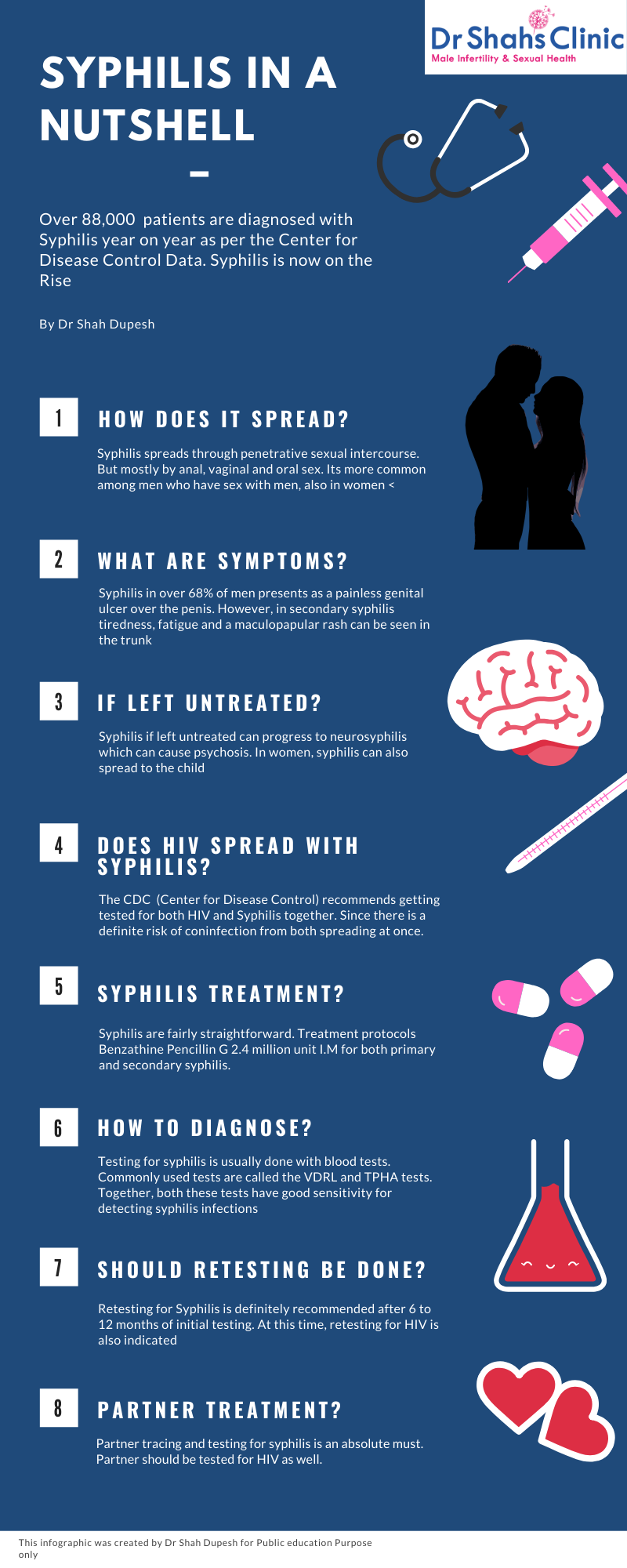Syphilis Treatment, Symptoms, Diagnosis & Cure
Vanakkam, Namaste, and Welcome to Dr. Shah’s Clinic for Male Infertility & Sexual Health.
In this article, I am going to tell you everything under the sun about syphilis treatment in chennai.
We are also going to discuss Syphilis symptoms, diagnosis, and management.
As a practicing sexology doctor in Chennai, I have seen numerous patients suffer from syphilis due to an improper diagnosis or treatment
Here is quick infographic for you below
What is syphilis?
Syphilis is a bacterial infection caused by an organism called ‘Treponema Pallidum‘.
In recent years, the rates of syphilis infections have been rising, more so among men who have sex with men.
Syphilis primarily spreads to penetrative sexual intercourse.
The disease has been well characterized and spreads in stages with distinct symptoms and clinical presentations.
The truth though is that this disease is quite difficult to diagnose and also treat since there could weeks of delay before a test for syphilis turns up positive!.
Moreover, many patients tend to get overtreated as well (due to testing becoming positive for a previously treated disease).
However, an important point to bear in mind is that syphilis requires an active workup and treatment, this is because syphilis can remain silent in the body and consequently damage the heart and all major body organs.
What are the stages of syphilis?
Syphilis treatments depend on the stage of the syphilis infection. To elaborate, the stages of syphilis proceeds as follows
1.Primary Syphilis –
Patients with primary syphilis present to the std clinstd clinicic with a painless genital lesion also called as a chancre.
Furthermore, these lesions need not strictly be confined to the genital lesion. Sometimes, these lesions can also present in other parts of the body like the oral mucosa or fingers in about 2% to 7% of patients.
Sometimes, these patients may also have multiple chancres.
2. Secondary Syphilis –
To elaborate further, primary syphilis can progress to secondary syphilis if left untreated.
This happens usually in about 6 to 8 weeks in general.
Moreover, secondary syphilis commonly presents with red macules or papule like lesions all over the body trunk.
In some patients though, the lesions can be severe leading to a condition called Luis maligna.
In secondary syphilis, the lesions formed can be directly sampled and checked for the presence of the bacterium.
3. Latent Syphilis –
Consequently, if primary and secondary syphilis is left untreated, the disease can progress into latent syphilis.
Latent syphilis presents without symptoms. However, latent syphilis is divided into 2 stages
Firstly, the early latent stage and secondly the late latent stage.
Most importantly, patients in the early latent stage are thought to be infectious as compared to the non-infectious nature of patients in the late latent stage.
All patients with unknown duration of latency should be strictly treated as a patient of late latency.
Consequently, over 1/3rd of patients with latent syphilis end up with tertiary syphilis if left untreated.
4. Tertiary Syphilis
Tertiary syphilis presents either as neuro-syphilis, cardio-vascular syphilis or as late benign syphilis.
Neuros-syphilis typically occurs when the infectious agent has crossed the blood-brain barrier. In these patients, symptoms of stroke, psychosis, weakness, memory loss et cetera may be seen.
Syphilis and Pregnancy
To emphasize, all pregnant women must be screened for syphilis infections. This is because in recent times, the rates of congenital syphilis has been rampantly rising.
There is high degree of case fatality in infants who get the syphilis infection from their mothers.
Thus active screening and treatment of all women who engage with multiple men sexually is recommended.
Syphilis and HIV
In all patients infected with HIV, syphilis screening is an absolute must.
The vice versa is also true, all patients with syphilis must be ruled out of suspected HIV infections. This is because, in patients with HIV, the risk of developing neurosyphilis is definitely high.
A CSF exam (cerebrospinal fluid exam) is recommended in all patients with syphilis and with neurological symptoms and also in patients where treatment failure is suspected.
Other common STD’s that should be tested in high-risk patients include Gonorrhea, Chlamydia and genital herpes lastly hepatitis B.
Syphilis Testing
For proper syphilis treatment, testing for syphilis is highly essential.
The recommended tests are the RPR and VDRL combined with TPHA for additional confirmation. In a large proportion of patients, the VDRL titers will drop in response to treatment.
A 4 four-fold drop in titers indicates a good response to therapy.
In some patients though, even after active treatment, the tests will still remain positive instead of turning negative, this is called the Serofast reaction.
For all patients, post syphilis treatment, repeat syphilis testing is definitely recommended after a period of 6 to 12 months.
Syphilis treatment Strategies
Syphilis treatment recommendations from the CDC (Center for Disease Control) has remained more or less the same.
- Firstly, for Primary Syphilis treatment, the recommended treatment protocol is Benzathine Penicillin G 2.4 million units i.m once
- Secondly, for both secondary and early latent syphilis treatment, the patient gets the same Benzathine Penicillin G 2.4 million units once
- However, for late latent syphilis treatment, the patient will get three weekly doses of Benzathine Penicillin G (a total of 7.2 million units i.m)
However, in some patients who are allergic to penicillin G, doxycycline 100 mg for 2 weeks or Ceftriaxone injection 1 g i.m once for 10 days or lastly Azithromycin 2 g orally once can be given.
Lastly, for patients confirmed with neurosyphilis, the treatment strategies are Crystalline penicillin G 18 million units administered as divided doses of 3 to 4 million units daily over a period of 10 – 14 days.
In some cases, Tab Probenecid 500 mg can also be used 4 times a day for 10 to 14 days.
Partner Tracing & Treatment
To conclude, for all patients diagnosed with syphilis, it is an absolute must to trace their sex partners and work them up for all possible STDs. Partner tracing, testing, and treatment is an absolute must for syphilis management.
I hope you enjoyed reading this short article on Syphilis treatment in chennai. Do share this article with all your friends and loved ones. If you are looking for an std clinic in Chennai get in touch with us below!
Dr. Shah’s Clinic for Male Infertility & Sexual Health
No 21, Ground Floor, Bazullah Road, T. Nagar, Chennai, Tamil Nadu 600017
Ph – +91-9790783856
References


